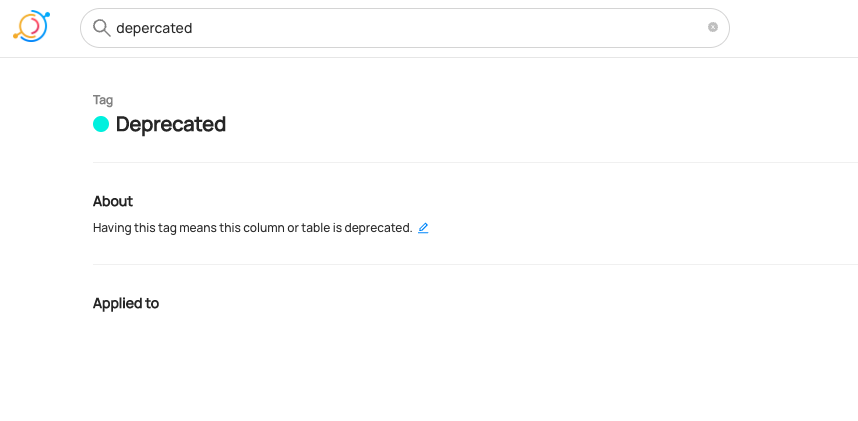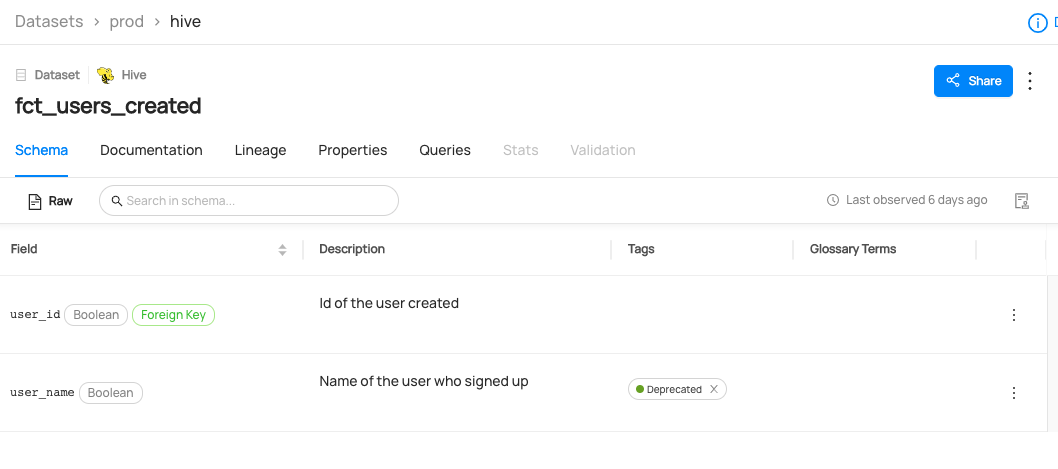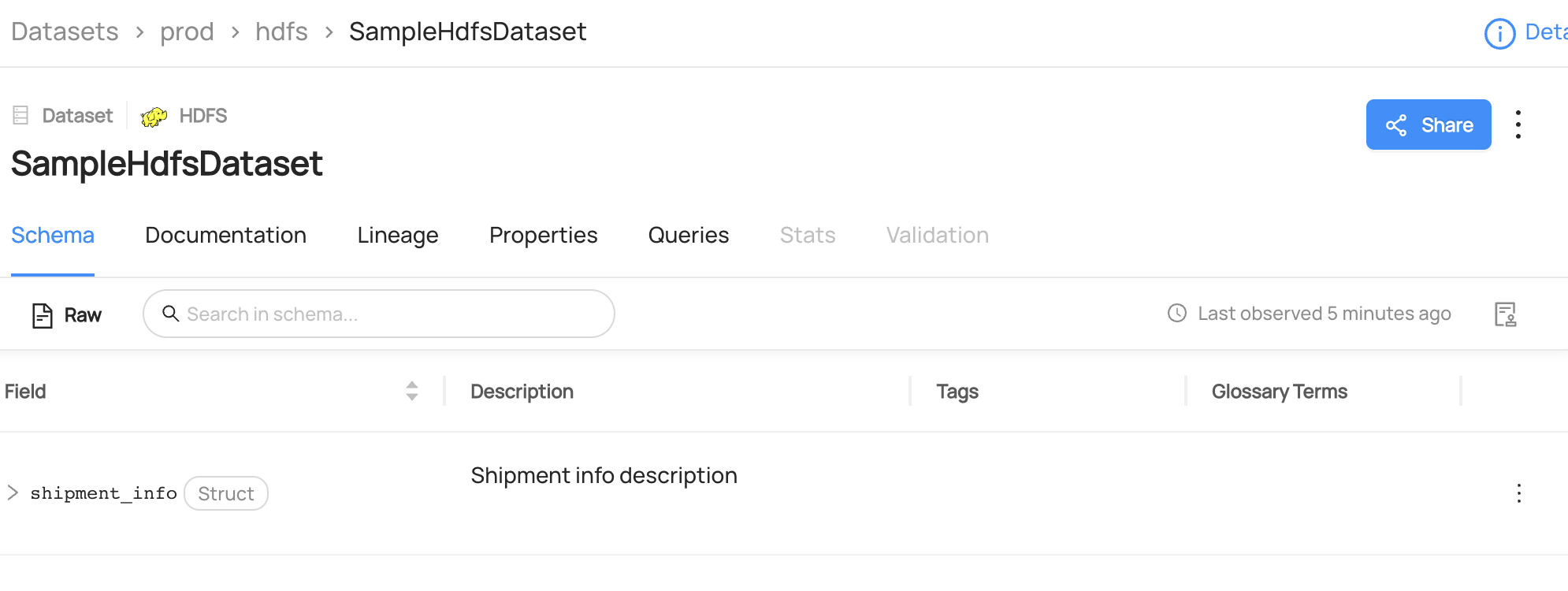Tags
Why Would You Use Tags on Datasets?
Tags are informal, loosely controlled labels that help in search & discovery. They can be added to datasets, dataset schemas, or containers, for an easy way to label or categorize entities – without having to associate them to a broader business glossary or vocabulary. For more information about tags, refer to About DataHub Tags.
Goal Of This Guide
This guide will show you how to
- Create: create a tag.
- Read : read tags attached to a dataset.
- Add: add a tag to a column of a dataset or a dataset itself.
- Remove: remove a tag from a dataset.
Prerequisites
For this tutorial, you need to deploy DataHub Quickstart and ingest sample data. For detailed information, please refer to Datahub Quickstart Guide.
Before modifying tags, you need to ensure the target dataset is already present in your DataHub instance. If you attempt to manipulate entities that do not exist, your operation will fail. In this guide, we will be using data from sample ingestion.
For more information on how to set up for GraphQL, please refer to How To Set Up GraphQL.
Create Tags
The following code creates a tag Deprecated.
- GraphQL
- Curl
- Java
- Python
mutation createTag {
createTag(input:
{
name: "Deprecated",
id: "deprecated",
description: "Having this tag means this column or table is deprecated."
})
}
If you see the following response, the operation was successful:
{
"data": {
"createTag": "urn:li:tag:deprecated"
},
"extensions": {}
}
curl --location --request POST 'http://localhost:8080/api/graphql' \
--header 'Authorization: Bearer <my-access-token>' \
--header 'Content-Type: application/json' \
--data-raw '{ "query": "mutation createTag { createTag(input: { name: \"Deprecated\", id: \"deprecated\",description: \"Having this tag means this column or table is deprecated.\" }) }", "variables":{}}'
Expected Response:
{ "data": { "createTag": "urn:li:tag:deprecated" }, "extensions": {} }
# Inlined from /metadata-integration/java/examples/src/main/java/io/datahubproject/examples/TagCreate.java
package io.datahubproject.examples;
import com.linkedin.tag.TagProperties;
import datahub.client.MetadataWriteResponse;
import datahub.client.rest.RestEmitter;
import datahub.event.MetadataChangeProposalWrapper;
import java.io.IOException;
import java.util.concurrent.ExecutionException;
import java.util.concurrent.Future;
public class TagCreate {
private TagCreate() {}
public static void main(String[] args)
throws IOException, ExecutionException, InterruptedException {
TagProperties tagProperties =
new TagProperties()
.setName("Deprecated")
.setDescription("Having this tag means this column or table is deprecated.");
MetadataChangeProposalWrapper mcpw =
MetadataChangeProposalWrapper.builder()
.entityType("tag")
.entityUrn("urn:li:tag:deprecated")
.upsert()
.aspect(tagProperties)
.build();
String token = "";
RestEmitter emitter = RestEmitter.create(b -> b.server("http://localhost:8080").token(token));
Future<MetadataWriteResponse> response = emitter.emit(mcpw, null);
System.out.println(response.get().getResponseContent());
}
}
# Inlined from /metadata-ingestion/examples/library/create_tag.py
import logging
from datahub.emitter.mce_builder import make_tag_urn
from datahub.emitter.mcp import MetadataChangeProposalWrapper
from datahub.emitter.rest_emitter import DatahubRestEmitter
# Imports for metadata model classes
from datahub.metadata.schema_classes import TagPropertiesClass
log = logging.getLogger(__name__)
logging.basicConfig(level=logging.INFO)
tag_urn = make_tag_urn("deprecated")
tag_properties_aspect = TagPropertiesClass(
name="Deprecated",
description="Having this tag means this column or table is deprecated.",
)
event: MetadataChangeProposalWrapper = MetadataChangeProposalWrapper(
entityUrn=tag_urn,
aspect=tag_properties_aspect,
)
# Create rest emitter
rest_emitter = DatahubRestEmitter(gms_server="http://localhost:8080")
rest_emitter.emit(event)
log.info(f"Created tag {tag_urn}")
Expected Outcome of Creating Tags
You can now see the new tag Deprecated has been created.

We can also verify this operation by programmatically searching Deprecated tag after running this code using the datahub cli.
datahub get --urn "urn:li:tag:deprecated" --aspect tagProperties
{
"tagProperties": {
"description": "Having this tag means this column or table is deprecated.",
"name": "Deprecated"
}
}
Read Tags
- GraphQL
- Curl
- Python
query {
dataset(urn: "urn:li:dataset:(urn:li:dataPlatform:hive,SampleHiveDataset,PROD)") {
tags {
tags {
tag {
name
urn
properties {
description
colorHex
}
}
}
}
}
}
If you see the following response, the operation was successful:
{
"data": {
"dataset": {
"tags": {
"tags": [
{
"tag": {
"name": "Legacy",
"urn": "urn:li:tag:Legacy",
"properties": {
"description": "Indicates the dataset is no longer supported",
"colorHex": null,
"name": "Legacy"
}
}
}
]
}
}
},
"extensions": {}
}
curl --location --request POST 'http://localhost:8080/api/graphql' \
--header 'Authorization: Bearer <my-access-token>' \
--header 'Content-Type: application/json' \
--data-raw '{ "query": "{dataset(urn: \"urn:li:dataset:(urn:li:dataPlatform:hive,SampleHiveDataset,PROD)\") {tags {tags {tag {name urn properties { description colorHex } } } } } }", "variables":{}}'
Expected Response:
{
"data": {
"dataset": {
"tags": {
"tags": [
{
"tag": {
"name": "Legacy",
"urn": "urn:li:tag:Legacy",
"properties": {
"description": "Indicates the dataset is no longer supported",
"colorHex": null
}
}
}
]
}
}
},
"extensions": {}
}
# Inlined from /metadata-ingestion/examples/library/dataset_query_tags.py
from datahub.sdk import DataHubClient, DatasetUrn
client = DataHubClient.from_env()
dataset = client.entities.get(
DatasetUrn(platform="hive", name="realestate_db.sales", env="PROD")
)
print(dataset.tags)
Add Tags
Add Tags to a dataset
The following code shows you how can add tags to a dataset.
In the following code, we add a tag Deprecated to a dataset named fct_users_created.
- GraphQL
- Curl
- Python
mutation addTags {
addTags(
input: {
tagUrns: ["urn:li:tag:deprecated"],
resourceUrn: "urn:li:dataset:(urn:li:dataPlatform:hive,fct_users_created,PROD)",
}
)
}
If you see the following response, the operation was successful:
{
"data": {
"addTags": true
},
"extensions": {}
}
curl --location --request POST 'http://localhost:8080/api/graphql' \
--header 'Authorization: Bearer <my-access-token>' \
--header 'Content-Type: application/json' \
--data-raw '{ "query": "mutation addTags { addTags(input: { tagUrns: [\"urn:li:tag:deprecated\"], resourceUrn: \"urn:li:dataset:(urn:li:dataPlatform:hive,fct_users_created,PROD)\" }) }", "variables":{}}'
Expected Response:
{ "data": { "addTags": true }, "extensions": {} }
# Inlined from /metadata-ingestion/examples/library/dataset_add_tag.py
from datahub.sdk import DataHubClient, DatasetUrn, TagUrn
client = DataHubClient.from_env()
dataset = client.entities.get(DatasetUrn(platform="hive", name="realestate_db.sales"))
dataset.add_tag(TagUrn("purchase"))
client.entities.update(dataset)
Add Tags to a Column of a dataset
In the example below subResource is fieldPath in the schema.
- GraphQL
- Curl
- Python
mutation addTags {
addTags(
input: {
tagUrns: ["urn:li:tag:deprecated"],
resourceUrn: "urn:li:dataset:(urn:li:dataPlatform:hive,fct_users_created,PROD)",
subResourceType:DATASET_FIELD,
subResource:"user_name"})
}
curl --location --request POST 'http://localhost:8080/api/graphql' \
--header 'Authorization: Bearer <my-access-token>' \
--header 'Content-Type: application/json' \
--data-raw '{ "query": "mutation addTags { addTags(input: { tagUrns: [\"urn:li:tag:deprecated\"], resourceUrn: \"urn:li:dataset:(urn:li:dataPlatform:hive,fct_users_created,PROD)\", subResourceType: DATASET_FIELD, subResource: \"user_name\" }) }", "variables":{}}'
Expected Response:
{ "data": { "addTags": true }, "extensions": {} }
# Inlined from /metadata-ingestion/examples/library/dataset_add_column_tag.py
from datahub.sdk import DataHubClient, DatasetUrn, TagUrn
client = DataHubClient.from_env()
dataset = client.entities.get(
DatasetUrn(platform="hive", name="fct_users_created", env="PROD")
)
dataset["user_name"].add_tag(TagUrn("deprecated"))
client.entities.update(dataset)
Expected Outcome of Adding Tags
You can now see Deprecated tag has been added to user_name column.

We can also verify this operation programmatically by checking the globalTags aspect using the datahub cli.
datahub get --urn "urn:li:dataset:(urn:li:dataPlatform:hive,fct_users_created,PROD)" --aspect globalTags
Remove Tags
The following code remove a tag from a dataset.
After running this code, Deprecated tag will be removed from a user_name column.
- GraphQL
- Curl
- Python
mutation removeTag {
removeTag(
input: {
tagUrn: "urn:li:tag:deprecated",
resourceUrn: "urn:li:dataset:(urn:li:dataPlatform:hive,fct_users_created,PROD)",
subResourceType:DATASET_FIELD,
subResource:"user_name"})
}
curl --location --request POST 'http://localhost:8080/api/graphql' \
--header 'Authorization: Bearer <my-access-token>' \
--header 'Content-Type: application/json' \
--data-raw '{ "query": "mutation removeTag { removeTag(input: { tagUrn: \"urn:li:tag:deprecated\", resourceUrn: \"urn:li:dataset:(urn:li:dataPlatform:hive,fct_users_created,PROD)\" }) }", "variables":{}}'
# Inlined from /metadata-ingestion/examples/library/dataset_remove_tag_execute_graphql.py
# read-modify-write requires access to the DataHubGraph (RestEmitter is not enough)
from datahub.ingestion.graph.client import DatahubClientConfig, DataHubGraph
gms_endpoint = "http://localhost:8080"
graph = DataHubGraph(DatahubClientConfig(server=gms_endpoint))
# Query multiple aspects from entity
query = """
mutation removeTag {
removeTag(
input: {
tagUrn: "urn:li:tag:deprecated",
resourceUrn: "urn:li:dataset:(urn:li:dataPlatform:hive,fct_users_created,PROD)",
subResourceType:DATASET_FIELD,
subResource:"user_name"})
}
"""
result = graph.execute_graphql(query=query)
print(result)
Expected Outcome of Removing Tags
You can now see Deprecated tag has been removed to user_name column.

We can also verify this operation programmatically by checking the gloablTags aspect using the datahub cli.
datahub get --urn "urn:li:dataset:(urn:li:dataPlatform:hive,fct_users_created,PROD)" --aspect globalTags
{
"globalTags": {
"tags": []
}
}